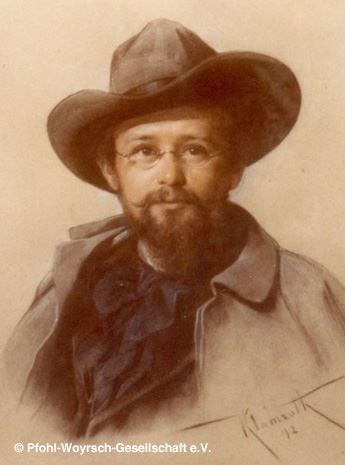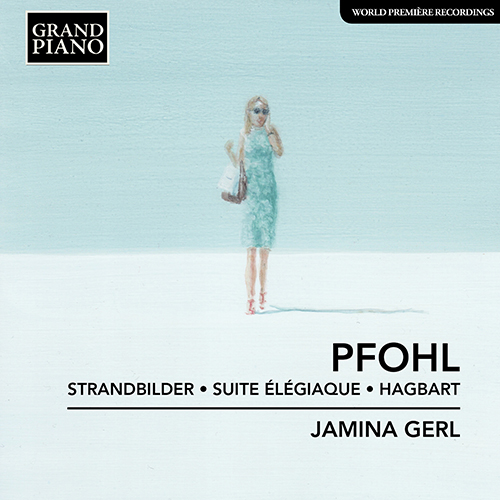
Ferdinand Pfohl (1862 - 1949)
Ferdinand Pfohl was renowned chiefly as a music writer, particularly for his long years spent as music critic for the Hamburger Nachrichten (‘Hamburg News’). However, he never lost his passion for composition, which he had first felt as a young man. Pfohl was born in 1862, spent his musical childhood and schooldays in the Bohemian town of Loket on the river Ohře (Elbogen an der Eger, in German) and after taking his Abitur (school leaving exams) at the Benedictine grammar school in Broumov (Braunau) in northern Bohemia, was set to have had a ‘solid grounding in classical education’. He was initially persuaded by his father to begin studying law in Prague, in 1881, but shortly afterwards he appears to have undergone a kind of epiphany. At the first performance of Parsifal in Bayreuth after Wagner’s death in 1883 Pfohl heard ‘a distant voice’ speak to him in a moment of high emotion ‘You belong to music, to music and music alone, and music belongs to you: it is your lifeblood, your soul…’
In the autumn of 1885 Pfohl fled parental influence, making his way from Prague to the musical hub of Leipzig, where he planned to enrol at the university’s philosophical faculty. Arthur Friedheim, a pupil of Liszt, arranged for the performance of Pfohl’s symphonic poem Die Apsarase, now lost: it was reportedly a ‘resounding success’. Professor Oscar Paul subsequently took him on as a theory student, free of charge. Leipzig was also the city where Pfohl made his first real friendships with the great artists and scholars of his time, including Ferruccio Busoni, Hans Sitt, Adolf Ruthardt, Wilhelm Rust, Hermann Kretzschmar and ultimately Edvard Grieg, who was also a regular visitor to Leipzig after his studies there.
Since his father refused all financial support after Pfohl had abandoned his legal studies, Pfohl had to make his living in Leipzig on his own. This he achieved through his work as a critic for the Leipziger Tageblatt (‘Leipzig journal’).
1892 proved to be a critical year in Pfohl’s life. On 31 August the distinguished music critic Dr Paul Mirsch had succumbed to cholera in Hamburg. His position as editor of the arts section of the Hamburger Nachrichten was promptly offered to Pfohl—thanks to the recommendation of no less than Hans von Bülow. The handsomely remunerated position required a correspondingly substantial amount of work: Pfohl was required to report on all the musical activities at Hamburg’s Stadttheater, while also giving talks on premieres at venues outside the city and writing reviews of books that were submitted.
Alongside his work as a writer, Pfohl also became joint director of the Vogt Conservatory in Hamburg in 1908. Here he gave his own idiosyncratic brand of lessons in musical theory, later also giving lectures in musical history. From 1924 to 1933 he also made a number of radio broadcasts. In 1914 he was given the honorary title of ‘Ducal Professor of Anhalt’ and in 1923 received an honorary doctorate from the University of Rostock. After moving several times within Hamburg, Pfohl finally settled in the district of Bergedorf in 1937, where he did a great deal of work for the Hasse society, which is still successful today. Pfohl died on 16 December 1949.


 Grand Piano has gained a reputation for producing high quality recordings of rare keyboard gems. Dedicated to the exploration of undiscovered piano repertoire, the label specialises in complete cycles of piano works by many lesser-known composers, whose output might otherwise have remained unknown and unrecorded.
Grand Piano has gained a reputation for producing high quality recordings of rare keyboard gems. Dedicated to the exploration of undiscovered piano repertoire, the label specialises in complete cycles of piano works by many lesser-known composers, whose output might otherwise have remained unknown and unrecorded.






